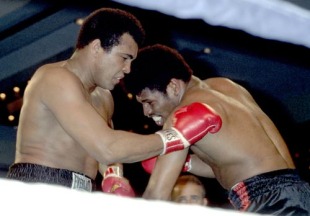- February 15 down the years
Spinks stuns Ali

1978
The day Goofy became world champion. Leon Spinks had a prominent gap between his front teeth, an easy target for one of Muhammad Ali's puerile nicknames. A safe target, too, it seemed. Two years earlier, Spinks had won gold at the Olympic Games by clubbing the dangerous Cuban Sixto Soria all round the ring. But that was at light-heavyweight (the same title Ali won in 1960), and Spinks hadn't grown much bigger. He hadn't had time to: this was only his eighth pro fight! But once it started, it was clear that Ali couldn't walk the walk quite so well any more. He was 36 by now, and all-action fighters like Ken Norton and Spinks could rough him up. Goofy did it well enough to win a split decision. In the ring with him after the fight was his brother Michael, who also won Olympic gold and also won the heavyweight title. Leon's son Cory won a world title for the first time in 2003. As for Ali. he could have retired with full honours, Instead he had another go at Spinks on September 15.
1958
Tony Tubbs was born in Cincinnati. He won the WBA heavyweight title on points from Greg Page in 1985 and lost it on points to Tim Witherspoon in 1986. Two years later, he tried to take three world titles from Mike Tyson, but probably didn't expect to stay long. He went in with a roll of flab that lived up to his name, and lasted less than two rounds. His last fight ended in a points win in 2006, when he was 48. He spent time in jail for 'cocaine-related crimes' and falling short with child maintenance payments.
1932
At the Winter Olympics, gold in the four-man bob went to an American team which included Jay O'Brien, who was only nine days short of his 49th birthday, the oldest gold medallist in any Winter Olympics - and Eddie Eagan, the only competitor to win gold in both the Winter and Summer Games. He was light-heavyweight boxing champion at the 1920 Olympics. Their bobsleigh was just a pair of blades with a steering wheel, completely open at the sides.
1985
The most gruelling, epic chess match of all time. Not long before, World Championship matches were played over a set number of games. If the score was level at the end, the champion kept his title. This time it was first past the post: the first player to win six games won the match. At first, this one didn't look as if it was going to last long. Anatoly Karpov had been world champion for ten years, ever since Bobby Fischer refused to defend the title. Now he faced a 21-year-old called Garry Kasparov, who was being tipped as one of the greats. Well he didn't look like one here, not for quite a while. Karpov was embarrassing him 5-0. Then: what? Complacency on one side, nothing to lose on the other? Kasparov inched his way back, playing draw after draw but winning the odd game. By the time they'd completed 48 of them, six months had gone by and Karpov's lead was down to 5-3. He was showing signs of physical and mental collapse. At that point, during the 49th game played today, the president of the world body abruptly cancelled the whole match and ordered it to be replayed. No wonder Kasparov organised a breakaway organisation a few years later. The rematch took place later in the year, under the old format of 24 games, and even a refreshed Karpov couldn't keep the young wolf out. Kasparov won 5-3, held off Karpov in three more title matches (5-4, 4-4, 4-3), and remained champion until 2000. The redoubtable Karpov came back to win the 'official' world title three more times, the last in 1998.
1992
For the only time so far, one team had two players sent off in a Five or Six Nations match. England hooker Brian Moore had been getting on French wicks for a while now, but it was the scoreline that ignited them today. At half-time in Paris, England led 15-4. As the score mounted in the second half, players lost their heads. Moore nearly lost an eye. He claimed prop Philippe Gimbert had gouged him in the very first scrum of the match. In the last twenty minutes, the rest of the French front row blew up and ceased to exist. Grégoire Lascubé raked Martin Bayfield and was sent off. Jeff Tordo moved from flanker to hooker and concussed Moore with a punch. Finally, hooker Vincent Moscato was warned by the Irish referee (in French) not to butt in the scrum. He did butt and the referee sent him off (in any language). The rest of the match descended into an orgy of knee-dropping. Gimbert, Lascubé, and Moscato weren't capped again. Almost incidentally, England won 31-13.
1994
Ekaterina Gordeyeva and Sergei Grinkov achieved what Torvill and Dean couldn't on February 18 by regaining their Olympic title. As in 1988, they won the gold medal in the pairs, beating defending champions Natalya Mishkutenok and Artur Dimitriyev into second place.
2002
Beckie Scott finished third at the Winter Olympics - and won gold almost two years later. In the combined pursuit, skiers race five kilometres using the classical technique then five kilometres freestyle. Scott finished ten seconds behind Russians Olga Danilova and Larissa Lazutina. The following year, she was upgraded to cabin class when it was discovered Lazutina had tested positive for a blood booster. Another two months went by, then Danilova lost her medal too, and Scott was a belated Olympic champion.
1904
Jack Johnson retained his 'colored' heavyweight title in a no-decision fight with Claude Brooks, whom the white press chose to call Black Bill. Things they had to put up with.

